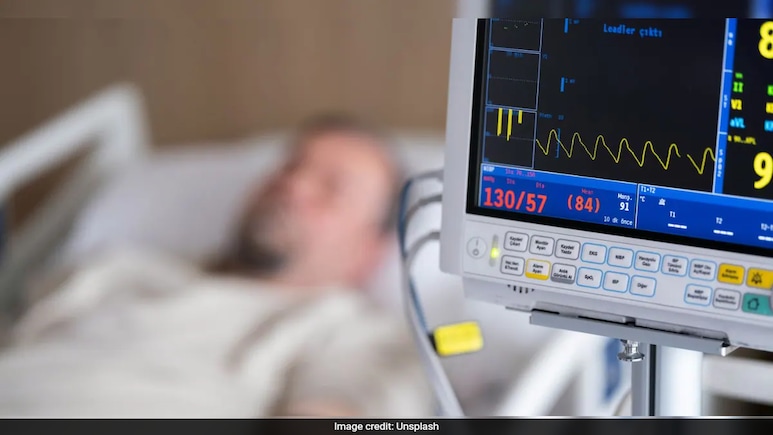
Heart attacks can be sudden, but often, there are warning signs that occur hours, days or even years before. However, these symptoms are mostly ignored. "Sudden heart attacks aren't always sudden - the body often sends signals long before the event," says Dr Joy Saibal Shome, Head of TAVI/TAVR, BM Birla Heart Hospital, Kolkata, told NDTV.
In 2024, cardiovascular diseases were a major health concern in India. Data indicates that 1 in 4 deaths in the nation are attributed to cardiovascular diseases. Heart disease is no longer a disease of the elderly; it now affects men, women and children at alarming rates.
Experts Urge To Notice Warning Signs
Sudden Symptoms: These symptoms include severe chest pain or discomfort, shortness of breath, lightheadedness or loss of consciousness.
Warning Signs: When people mistake mild symptoms like chest discomfort, fatigue or indigestion for other conditions.
Prodromal Symptoms: Some people may experience symptoms like unusual fatigue, chest discomfort or shortness of breath in the days or weeks leading up to a heart attack. Prodromal symptoms can be subtle and non-specific, hence they are difficult to identify initially. But experts have said that understanding these symptoms is crucial for timely intervention and preventing the severity of any disease.
Also Read | Neurocysticercosis: Experts Weigh In On This "Serious" Brain Infection That Increases During Monsoon
"Today's healthcare culture does more to react to heart attacks than to prevent them. But the reality is, the body begins to signal trouble years before a cardiac event," Mr Sid Das, Co-founder, eGenome, told NDTV.
Experts have said that it's essential to recognise the warning signs and seek medical attention immediately if someone you know is experiencing symptoms like:
- Chest pain or discomfort
- Shortness of breath
- Pain or discomfort in the arms, back, neck, jaw, or stomach
- Lightheadedness or dizziness
- Cold sweats
- Nausea or vomiting
"Risk factors associated with the increased incidence of coronary artery disease are diabetes, hypertension, obesity, lack of physical exercise, lack of adequate resting hours, consuming alcohol and smoking," Dr Dixit Garg, Consultant Intervention - Cardiology, Manipal Hospital Gurugram, told NDTV.
Alarming data associated with obesity reveal that it is now a fast-increasing challenge for nearly every country of the world, with pervasive economic and health impacts, particularly as it relates to the world's biggest killer - cardiovascular disease.
According to the World Heart Federation, 878 million adults lived with obesity in 2022, which is much more than the 194 million who lived with the disease in 1990. It is projected that nearly 2 in 3 adults aged 25 years or older could live with overweight or obesity by 2050 if the current growth trends continue.
Also Read | Why Gen Alpha Will Be The Most Watched Generation In Human History
"For individuals over 35 - and especially those with risk factors like diabetes, hypertension, smoking, or a family history of heart disease - early screening is key," Dr Shome advised.
A basic cardiac workup, including ECG, echocardiogram, lipid profile and increasingly, a CT coronary angiogram, can detect problems before they turn fatal.
New Tech Track Disease "As It Develops"
Focusing on the issue, the co-founder of eGenome, a firm that is pioneering in predictive health ecosystem, said that the problem is that we're still relying on periodic tests and reactive care, while cardiovascular disease progresses quietly, continuously and often fatally.
"That's the clinical blind spot. That's where we lose patients," Mr Das said, adding that subtle fatigue, breathlessness, and low-grade inflammation are not incidental symptoms; they're early signs of cardiac stress.
Also Read | Study Reveals When Human Body's Ageing Process Accelerates
He emphasised the use of advanced technology to identify the early symptoms, as with real-time biomarker analysis and artificial intelligence (AI), the experts finally have the tools to track this disease as it develops, not after.
"Beyond predicting genetics, the endeavour is to catch early physiological deviation, something we've never been able to scale before. The next steps in healthcare development will allow us to move from episodic care to continuous risk monitoring. Especially in India, where access is uneven and first events are often fatal, this shift is critical."
Mr Das said that the cardiac disease doesn't have to "surprise us" because the body whispers long before it screams; we just need to start listening.
Track Latest News Live on NDTV.com and get news updates from India and around the world

